
[HOME ] [ABOUT] [PHOTOS] [VIDEO] [BLOG] [HOUSTON] [TEXAS] [U.S. NEWS] [WORLD NEWS] [SPORTS] [POP CULTURE] [CONTACT]
Part IV: Dr. Kiyingi-I want to give Uganda back to her people
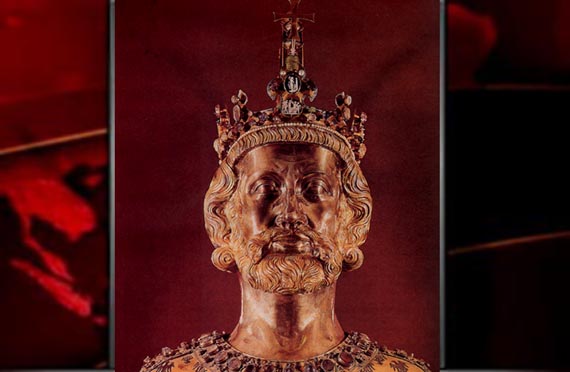
Portrait bust of Charles the Great or Charlemagne who is also referred to as Karoli Magna or Carolus Magnus in Latin. Charlemagne's biggest mistake that led to the eventual collapse of the Carolinigian Empire was his failure to recognize the uniqueness of the tribes he ruled over, and that the culture with their ancestral roots that had existed before Charlemagne came to power, was more important to the Frankish, Germanic, Spaniard, Burgundians, Lombards, Saxons, Vikings and so forth, than their allegiance to the powerful Emperor. He miserably failed to force the tribes to abandon their cultural heritage and live as a multicultural entity. The result, is Europe as we see today where each tribe independently became a nation speaking a common tongue. Those who spoke the Germanic language called their nation Germany. The French-speaking tribes called theirs France, the Spaniards called theirs Spain and so forth.
by Joseph Earnest May 11, 2015
Newscast Media HOUSTON, Texas—True leaders are not only concerned with the safety of their nations, but also the well-being of the citizenry. When the citizens are secure in their homes, in health, and the workforce, it is inevitable that they will accomplish undertakings for both their own good and the good of their nations.
This historical fact is demonstrated in what Europeans and even the U.S. government referred to as the most advanced race of Black people from Africa—the Baganda tribe.
Some so-called historians from the West, who are actually disinformation agents and revisionists, have attempted to smear the Kingdom of Buganda as one that engaged in slavery. No African nation, with the exception of Abyssinia currently known as Ethiopia, willfully sold off its people to the Europeans, Jews or Arabs. Slaves were taken by force through village raids.
With all the "White guilt" that the European race carries around, if there were any agreements in which African chiefs had signed and authorized the sale of slaves, they would have already produced them by now to absolve themselves of the shame. Yet there has never been any European country that has produced any such document.
On the other hand, there are documents that show the contrary. The Kingdom of Buganda, for example, made sure that no person could buy or sell slaves, in Buganda and its tributary states, and if caught, such a person was to be punished with death.
Europeans were fascinated by the sovereignty the Baganda carried themselves with and German military officer and doctor Dr. Carl Peters, acknowledged that the Baganda, by nature, were born to rule. In an extract from his notes he wrote: "...they have within themselves that instinctive feeling of superiority over others which is the natural and indispensable condition of sovereignty...The gift of authority is, as it were, in the blood of the Waganda, and this superiority is nowhere denied." (Analysis of Dr. Carl Peters of the Baganda tribe: Notes on New Light on Dark Africa, pp. 406). The word Waganda is the Swahili equivalent of Baganda.
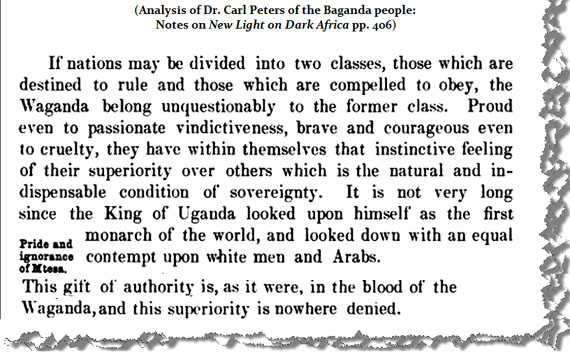
As for the development of their intelligence, Dr. Carl Peters writes the following:
"In development of their intelligence, the Waganda undoubtedly excel every other African nation...In contrast to all other Negro tribes, the Waganda feels the necessity of progress...In the Waganda there is fire, appreciativeness, and intelligence, and without question this tribe has a future before it..." pp. 407. See below:
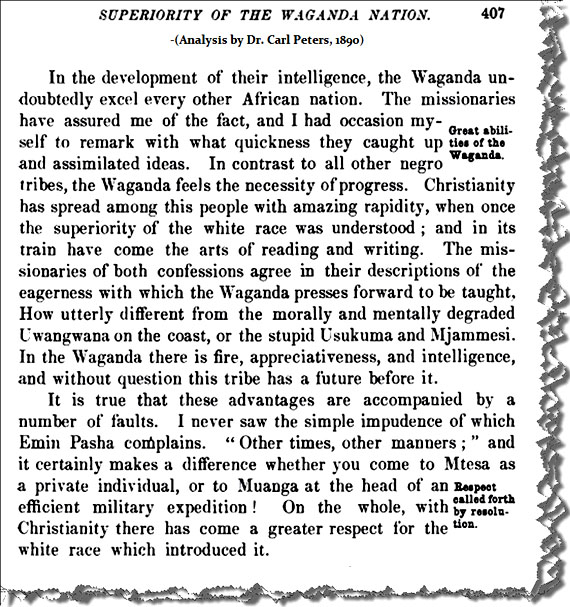
On March 1, 1973, almost a century after Dr. Carl Peters made his prediction, the United States State Department, in a declassified memo, acknowledged that when Uganda was being governed by the Baganda (in 1963), it was one of Africa's most promising countries. Here is an extract of the memo: "...Ten years ago (meaning 1963), Uganda was one of Africa's most promising countries. Today it is one of the worst governed..." (US State Department Memo: Will Amin Survive? March 1, 1973).
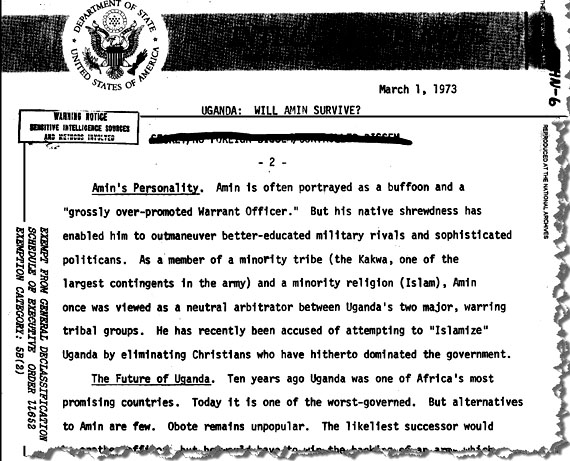
Research from colonial records shows that not only are the Baganda excellent administrators, they are also very capable in accounting areas and in expanding the economy of their nation.
For example, between the years of 1939 to 1952, an audit of the treasury in Buganda's Bulange-Mengo reveals that every year, the national budget had a surplus, and the expenditure was accounted for. Unlike future regimes in which there is no accountability and the entire nation is plunged into debt, the Uganda Journal shows that in 1939, there was a surplus of £1,132,000 million British pounds which would be equivalent to $1,748,091 million dollars. In ten years, 1949, the surplus of the treasury had quadrupled to £4,694,000 million pounds or $7,248,709 million dollars. In 1952 it had almost increased 12-fold to £11,561,000 million pounds or $17,853.074.
The records reveal that £5 million of the £ 11,561,000 was set aside for another depart- ment. (Uganda Journal, Revenue, Expenditure & Surplus Balances of Uganda, 1945-52).
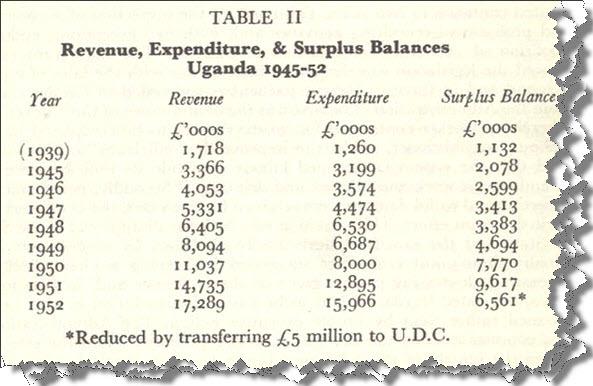
A surplus of $20 million dollars in Uganda's treasury, even by today's standards, is something Ugandans can only fantasize about. Had coups not disrupted the administrative structure in 1966 under Obote, then in 1971 under Idi Amin, in the early 80s under Tito Okello and in 1986, for the past 30 years under Yoweri Museveni, Uganda as we know it, would be part of First World countries as predicted by the United States State Department in 1971. Greed and opportunism have left Uganda a failed state today.
Going back to the issue of slavery and whether it occurred in this region, the first non-Black to enter Buganda was an Arab called Isau bin Hussein, who was nicknamed muzaga (the hairy one). He entered the court of Kabaka Ssuuna II in 1850. This is long after slaves were shipped to the Americas. In fact slave trade from East Africa was called the "Arab Slave Trade" since Arabs used the northeasterly trade winds for transport as they traveled in search of slaves across the Indian ocean, not Atlantic Ocean.
Isau bin Hussein penetrated Buganda because he was fleeing his creditors in Zanzibar. He garnered a harem of about 300 women in Buganda, to this very day, there is a small population of people living in Buganda whose race or origin is unknown but they appear to be mulatto.
After Ssuuna II fell asleep, his son Kabaka Muteesa I ascended to the throne. He then invited missionaries to the kingdom in the 1870s. Once the Arabs learned that Whites were being given permission to enter Buganda, they too attempted to penetrate, but the missionaries had warned the Kabaka, that Arabs were only looking for two things: to Islamisize the Kingdom of Buganda and to drag the non-believers off as slaves to Arabia.
To protect the safety of his subjects and all other tributary nations that paid tribute to Baganda kings (Unyamwezi, Karagwe, Usagara currently called Ankole, Gamabaragara currently known as Tooro, Bunyoro and other princedoms), Muteesa, upon hearing that an Arab trader with guns was inquiring about the possibility of buying slaves, which in Buganda was repugnant, since according to Carl Peters, King Muteesa looked down upon Arabs and even Whites, a decree was issued that anybody seeking to buy or sell slaves should be put to death at the spot.
In Buganda, the Baganda people are referred to as Baana ba Kintu (Descendants of Kintu the Divine). Therefore harming one or even thinking of enslaving a Muganda was an insult to the king himself since he too descends from the House or dynasty of Kintu.
Reverend Alexander Mackay who was a witness to this decree made the following entry in his diary: "Lately an Arab trader arrived with guns and cloth for which he wanted only slaves...Then I gave a lecture and asked why such an organism as a human body, which no man can make, can be sold for a rag of cloth which a man can make. The result was not only the rejection of the Arab's demand, but a decree forbidding any person in Uganda to sell a slave on pain of death..." (Mackay's Diary, January 10, 1879, pp. 105)
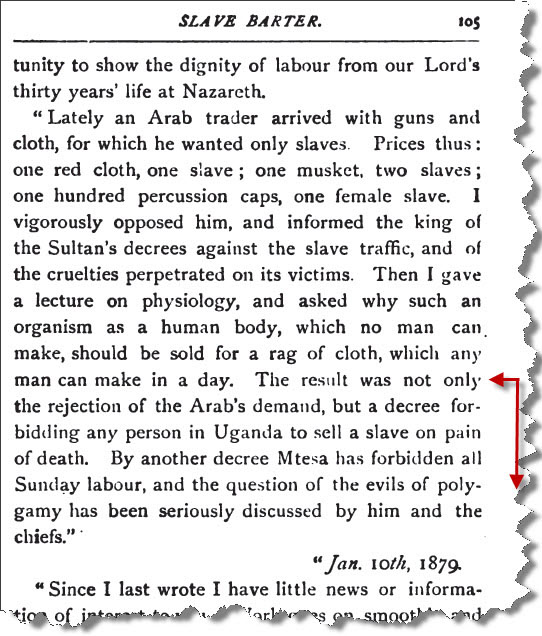
After Muteesa I fell asleep in October 1884, his son Kabaka Mwanga II ascended to the throne and in the witness of Captain Frederick Lugard of the Imperial British East Africa Company, signed another expanded degree forbidding what his father Muteesa forbade. The decree in part reads: "...Clause 10. Slave-trading or slave-raiding, or the exportation or importation of people for sale or exchange as slaves, is prohibited. Dated Kampala, this 30th day of March 1892). Signed by Mwanga, Kabaka of Buganda, F.D Lugard and Capt W.H. Williams." Source: Colonial records.
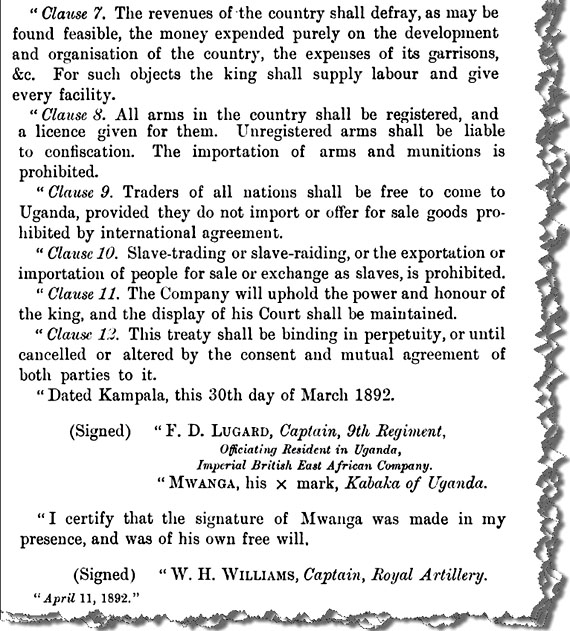
The question that arises is, why did Mwanga feel compelled to issue another decree if his father Muteesa already had one in place? Mwanga had initially thought that the slave raider and traders would be Arabs, but when the I.B.E.A. Company showed up with Sudanese slaves that were being used as mercenaries, Mwanga got concerned that the British would raid villages and take Baganda to die on the frontline just like the Sudanese. It is because Mwanga wanted to free the Sudanese from ill-treatment by the British, that he organized a revolt against the British as was demonstrated in Part I.
Mwanga respected the Luo, even though he came from a Bantu bloodline. He fought and put his life on the line for them and led them in war against the British who had sophisticated weaponry. It is for this very reason the British hated him and fought for a decade to unseat him from the throne.
The purpose of the above illustration is to demonstrate that true leaders will at all times secure the safety of their people and the territorial boundaries in which they live. These undertakings were what made Buganda rise above all other kingdoms in Africa and as we will see in Part V, the British themselves acknowledges that the Baganda were actually the ancient Egyptians who introduced cultural arts and civilization to the rest of the Continent.
For now, we will talk about a mistake that all presidents in Uganda have made from Milton Obote to the current Yoweri Museveni. They are making and have made the same mistake that Charlemagne made, resulting into the fall of the Carolingian Empire.
The Carolingian Empire did not outlive the ninth century. Four issues were critical to its destruction: geographic and ethnic complexity, the quality and reputation of leadership, political and dynastic strife and outside attacks.
Frequent divisions of the empire, or segments of it, placed local nobilities in the difficult position of changing their allegiance frequently and of jeopardizing their offices and landholdings.
In the Treaty of Verdun in 843 three grandsons of Charlemagne—Charles the Bald, Louis the German and Lothair, divided the kingdom into three realms—the West Frankish which became France, the East Frankish which became Germany and the Middle kingdom which became the Italian kingdom and other sub-kingdoms under Lothair.
The forces that were dissolving the Carolingian Empire were intensified by the need to organize defense on the local level—and by the feeling at the local level that the far-off king and his theories of government were of little help to the crises they faced.
In this respect, the experience of the Carolingian Empire parallels that of the caliphate. There an entity so huge was laid over the top of many older, smaller entities. Each of those regional entities was indelibly marked by Islam, the Arabic language, and the institutions of the caliph. In the end, the caliphate, like the Carolingian Empire, broke down into smaller units that, although changed in key ways, were true to their own histories. This has been the experience of every multinational empire in the West from Sumer to the Soviet Union. (Western Civilization: The Coming Experiment, chapter 8, pp.293-299).
That Uganda in it current state will eventually evolve into individual nation-states with a certain level of autonomy is inevitable. What Obote, Amin, Okello and Museveni have attempted to do is sandwich all these unique tribes under the umbrella of a failed British experiment called Uganda, expecting the unique tribes to abandon their own histories that existed before these political actors appeared on the scene. It will never happen, just as it failed under Karoli Magna and his grandsons. To deny one's ethnic cultural and traditional roots is to deny the existence of the human God-given soul, since it is the soul through which the personality and cultural traits are expressed.
It would be equivalent to having a human being without a human heart and expecting that person to display emotions. Such would be impossible because it is the heart through which emotions are expressed, that's why when a parent is disappointed in a child's behavior he or she will say, "You're breaking my heart." The parent never talks about the knees, eyes, ears, stomach, brain, liver or elbows, since even though those body parts are necessary, they do not have the ability to allow emotions to manifest themselves.
The Germanic tribes under Louis the German kept their language and rich culture and that country is separately known as Germany. Charles the Bald led the Frankish tribes that formed their own nation called France, and from Lothair would evolve Italy and Switzerland as we know them today. All three grandsons of Charlemagne understood a truth that their grandfather failed to grasp, just as Ugandan presidents have no concept of that truth.
Laying a huge entity and calling it the Carolingian Empire or in this case Uganda, over smaller pre-existing entities will never build a cohesive society able to sustain itself. Loyalties will always be divided. With the oldest tribe in Africa, the Baganda, it will always be their loyalty to their heritage first, then to Uganda second.
When one mentions "Uganda" a non-Muganda sees a collection of tribes that form a nation. However, to a Muganda, the word "Uganda" immediately conjures the image of several foreign hostile tribes surrounding the sacred and ancient Kingdom of Buganda. The issue is so serious that Museveni's administration have been discussing the possibility of introducing a law that will force people to love Uganda and its lawmakers. The law was called the Patriotism Bill which veteran politician Dr. Olara Otunnu called "utter fraud".
"Now unless we say that we should be proud of and celebrate corruption, discrimination, segregation, poverty and brutality, there is no point in being patriotic in Uganda,” Otunnu maintains. He claims the bill is meant to ensure that President Yoweri Museveni is praised across the country. (pop-up)
Last year when Luweero's member of parliament Brenda Nabukenya won the MP seat against Museveni, her supporters, rather than sing the national anthem of Uganda, burst out in song with the national anthem of the Kingdom of Buganda.
In his essay "Why Envy Buganda's Prominence?" former chaplain of Makerere University, Father Lawrence Kanyike writes: "The Baganda, despite being the most accommodating culture in Uganda, never desired to federate with any state. They are not against unity but that this should not be done at the expense of sacrificing their culture.
"For them unity should not destroy their uniqueness and prominence. They rather subscribe to the belief that Buganda must be in Uganda than that Uganda be in Buganda and so their agitation for “federo”. No wonder Buganda declared its own independence from Britain on October 8th,different from the common one of October 9th. Up to now, a Muganda does not feel patriotic enough if after the singing of the National anthem, the Buganda anthem, the Kitiibwa Kya Buganda is not sung.
"There is a feeling that Buganda must stand out and its greatness, its kitiibwa, its civility, must be preserved. Their civility and their love for their homeland has made many non Baganda elites to purchase land in Buganda. There is no tribe in Uganda that loves its homeland more than the Baganda.
"Unfortunately, Buganda’s civility, historical prominence and love for its homeland has been interpreted as arrogance and has made them a subject of envy by other surrounding tribes , accusing Britain of favoring it over other areas by starting all developmental programmes in Buganda.
"Unless the leadership of this country stops being envious of Buganda’s prominence and allows its rightful position in Uganda, Buganda will continue to believe that there is a deliberate intention to grab its land and render Baganda vagrants in their own homeland.
"Should we conclude with the ominous statement of William Shakespeare that the Tragedy of Administration is to put a small man in a large office because he soon reduces it to his own size? God forbid! The entire essay by Fr. Lawrence Kanyike can be downloaded here. (pop-up)
After independence, the political leaders who wanted to offend Mengo, the actual seat of power in Uganda, targeted high-profile Baganda doctors, businessmen, intellectuals and religious practitioners.
Most of them died under suspicious circumstances, thus there is a prediction, based on the abhorrent behavior of some (not all) non-Baganda, that after this current NRM falls, there will be an exodus of those from Southwestern tribes, back to their regions of origin because of the oppression they inflicted for three decades upon the Baganda and Luo. The exodus will be out of guilt and the fear of facing revenge at the hands of those they have so brutally and mercilessly oppressed, under Museveni's regime.
A preview of that wrath was demonstrated after the Buganda massacre of 2009, where government soldiers shot Baganda with live bullets triggering riots. During those riots, most people from Ankole (Busagara Kingdom) closed their businesses within Buganda because they had kept silent while the Baganda were being killed and oppressed, therefore they knew that no one would speak out for them when hostilities erupted.
The United States State Department has listed the crimes committed under Museveni during that period, and made them public including: vigilante killings; politically motivated abductions; mob and ethnic violence; torture and abuse of suspects and detainees; harsh prison conditions; official impunity; arbitrary and politically motivated arrest and detention; incommunicado and lengthy pretrial detention; restrictions on the right to a fair trial and on freedoms of speech, press, assembly, association, and religion; restrictions on opposition parties; electoral irregularities; official corruption; violence and discrimination against women and children, including female genital mutilation (FGM), sexual abuse of children, and the ritual killing of children.
As for targeting Baganda, the State Department reported, "Violent riots erupted in Kampala on September 10 and 11 after the government imposed travel restrictions on the king of the Buganda Kingdom. Security forces used tear gas and live ammunition to disperse demonstrators, resulting in 26 deaths and numerous injuries." (pop-up)
Obote and Amin did the same to Baganda, now the Luo who were once in power and lived in the upscale suburbs of Buganda like Nakasero, Kololo, Makerere, Muyenga and so forth, are themselves victims of oppression. Their land is being grabbed in every direction by foreigners, and it is now that they wish they had spoken out against the oppression of the Bantu, while land grabs were focused in Buganda.
The current tribes from western and southwestern Uganda have enjoyed their honeymoon for three decades, living off of "easy money" and the people who arrived in Buganda as peasants realize there is a reckoning that needs to be reckoned, and within a matter of years, because they never defended the Baganda and Luo, nature will not let the injustices that have been committed go unpunished, since they have violated all the laws of hospitality while guests in Buganda.
As we have seen, the allegations that certain ethnic groups have been targeted and oppressed are not being made out of thin air, or else the US Department of State would not publicly expose the evil acts committed under Museveni's watch, without evidence. *Click here to download the entire US Department of State report in PDF. (pop-up)
The appearance of Uhuru Kenyatta at the ICC as a civilian, was meant for one purpose only: to set "legal precedent" for indicting and prosecuting sitting African presidents. Therefore, the extensive human rights violations report of atrocities occurring in Uganda are not to be taken lightly, and should be giving the current regime nightmares.
Dr. Kiyingi, being a Muganda, carries with himself a blessing and a curse. A blessing, in that, because of his ethnic origin, he is genetically predisposed to the necessity of progress. A curse, in that, his ethnic heritage makes him an object of envy, much like Lord Mayor Erias Lukwago. Having publicly pledged to give Uganda back to her people, Kiyingi has become a threat to the central government, unlike Tinyefunza and Kyakabaale who committed worse offenses, but were allowed to go back home, or even to contest for the presidency—partly because they belong to Museveni's tribe.
Find out in Part V what Uganda will look like within a decade of Museveni's exit>>
Add Comments>>
Related stories:
Part I: Dr Aggrey Kiyingi and Uganda's Museveni lock horns
Part II: Kiyingi-How Museveni compromised 2016 election
Part III: Dr. Kiyingi's version of Museveni's 118 assassins
Part IV: Dr. Kiyingi-I want to give Uganda back to her people
Part V: The new Uganda within a decade of Museveni's exit
|
|
Join the Newscast Media social networks
for current events and multimedia content.
Copyright© Newscast Media. All Rights Reserved. Terms and Privacy Policy
